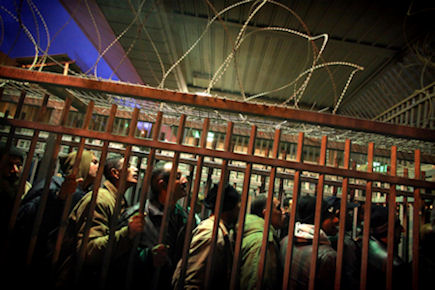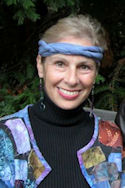have the fears from our history
crusted our eyes
like the inside of kettles
have they rusted the hinges
of our mouths
have our machine guns
and tear gas and
bulldozers turned
back on us, the barbed wire
of our laws bound our hearts,
caused our souls to forget
their fingerprints
—From the collaborative work-in-progress, Dare I Call You Cousin,
and previously published in
Rabbis for Human Rights (December 2011); reprinted here with author’s
permission
You can barely see, at first, in the dawn light, working men
jump from buses, race to get in line, the banter between them.
You can’t see the signs like in a dream when your eyes won’t
open. What you can see are men bundled against the cold
night air, men who jostle, shove, climb the steel bars, try to
break the queue, men who pray, who face east, kneel, press
their heads to cold concrete, all who wait for the gate to open.
And then you hear it, a few words slipping from lips—parched
wells, the wadi, permits denied for cisterns, permits denied
to build a bakery, and when you do, the bulldozer. What you
hear is the gasp rising, the not-so-slow stifle. What you see
are soldiers, teenagers, some in their twenties, machine guns
slung like satchels over their shoulders, their boots clacking
the concrete, and no one moving to open the gates. What you
hear are students in the “Humanitarian Line,” It’s for nothing
you’re filming us. They come, they film, nothing changes.
What you hear is the silence of a woman wearing a black
hijab, who carries a sac of books in her arms. What you
see is a man who clutches his side and tells you, I wait
here, away from the crush. I got my ribs broken last week
in the line. What you smell are figs in the fingers of a child,
her father beside her, I’m taking her to hospital in Jerusalem,
he says to you in Hebrew. And when the interpreter translates,
Her name is Pella, you hear her whisper in his ear, Baba, I
need to use the bathroom, and there is none. What you hear
is a businessman with three daughters, taking them to school
in East Jerusalem. What, he says, waving his arm at the steel
bars, the soldiers, the guns, are my daughters learning from this?
—From the collaborative work-in-progress, Dare I Call You Cousin;
reprinted here by author’s permission

Notice: Photograph is protected by international
copyright law.
Please click on image for gallery and details.
“Qalandiya Checkpoint” by Michal Fattal
(Reproduced here by permission)
|
What do you do when poems start spilling out about Israel’s Occupation of
Palestinian Territories, and you need to be there? In Fall 2011, I traveled to Israel
and the West Bank to research and interview Palestinians and Israelis living through
the Occupation. I toured initially with Rabbis for Human Rights, and then stayed
in Jerusalem, working in collaboration with Michal Fattal, an Israeli photographer
who works for Haaretz, and Yossi Yacov, an Israeli videographer, who has
been documenting the peace movement for years.
The poems, “When Your Eyes” and “In the Mirror” are part
of our work-in-progress titled, Dare I Call You Cousin, a multi-disciplinary
multicultural exhibition and E-book that witness the lived experiences of Palestinians
and Israelis. The project, funded in part by a grant from Portland’s Regional
Arts & Culture Council, portrays multiple points of view, and aims to educate and
encourage audiences to participate in the dialogue and expand the diversity of voices
for peace.
I think of poet Martín Espada, who, when asked, What is poetry good for, said,
“In a time of war, the government divorces language from meaning….
They drain the blood from words. Poets can put the blood back into words.”
This is a deeply personal art project. I’m on a journey to unlock the complex
way I experience the Occupation and human rights: I was married for 20 years
to a man who is a child-survivor of the Holocaust. My grandmother walked out of
Russia by herself at the age of 13 to escape pogroms. Why am I doing this? Perhaps
the question is, how can I not.

Photograph by
Tey Roberts
|
is the author of five books: Making of a Matriot, Raising The Tents,
and three collaborative poetry-photography books and exhibitions shown in capitol
buildings across the U.S. The two poems in this issue are from her collaborative
work-in-progress, Dare I Call You Cousin.
Professor Emerita and Founder of California State University Monterey Bay’s
Creative Writing and Social Action program, Adler lives in Portland, OR.
is an Israeli photojournalist with whom Frances Payne Adler worked while in Israel and
the West Bank. SHJ appreciates permission to use her disquieting photograph.
www.michalfattal.com